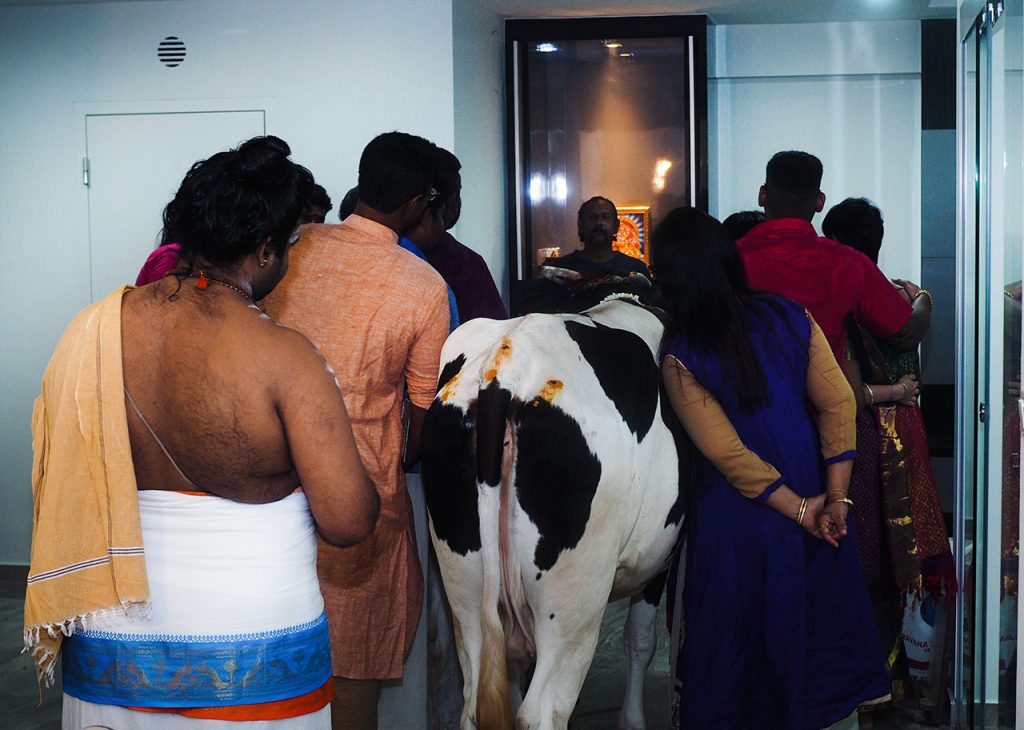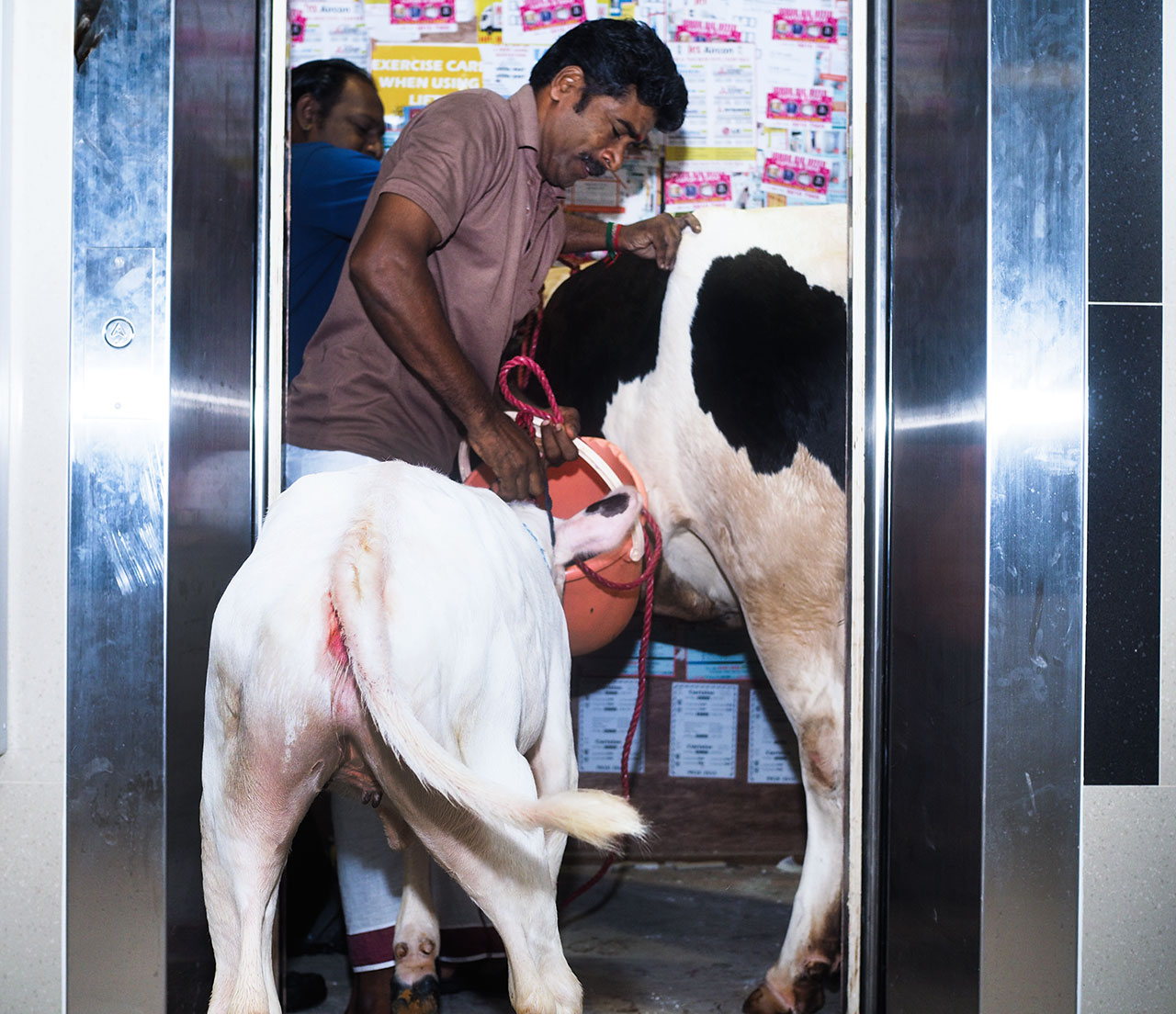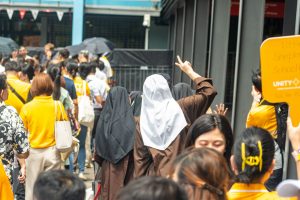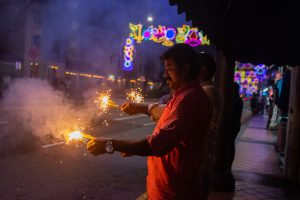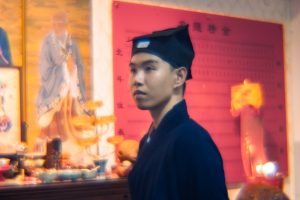I should be asleep or, at the very least, home.
Instead, I’m standing below a block of newly-built flats in Woodlands watching Durga, a 3-year-old cow, and Rani, her 1-month-old calf, disembark from the back of a beat-up blue lorry.
They’ve come to bless a house.
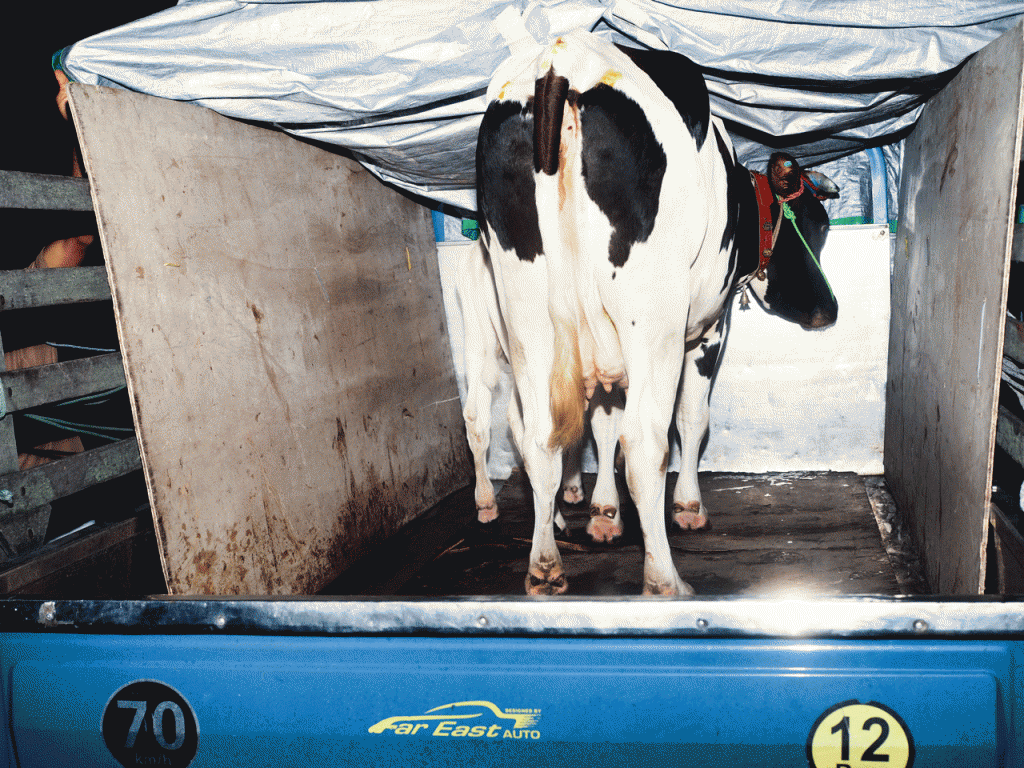
Our quest to find out for ourselves led us to Durga and Rani, just 2 of the 60 cows that belong to the Viknesh Dairy Farm.
Although the farm’s mainstay is in its production of fresh milk, it has for the past 40 years conducted cow blessings for Hindu temples and homes. It is also the only place in Singapore that offers such a service.
Raja, who manages the farm, informs me that only the females and their babies partake in the rituals. The selected cows are specially trained in the necessary logistics, such as how to alight and board a truck, and how to enter a lift.
Everyday things, really.
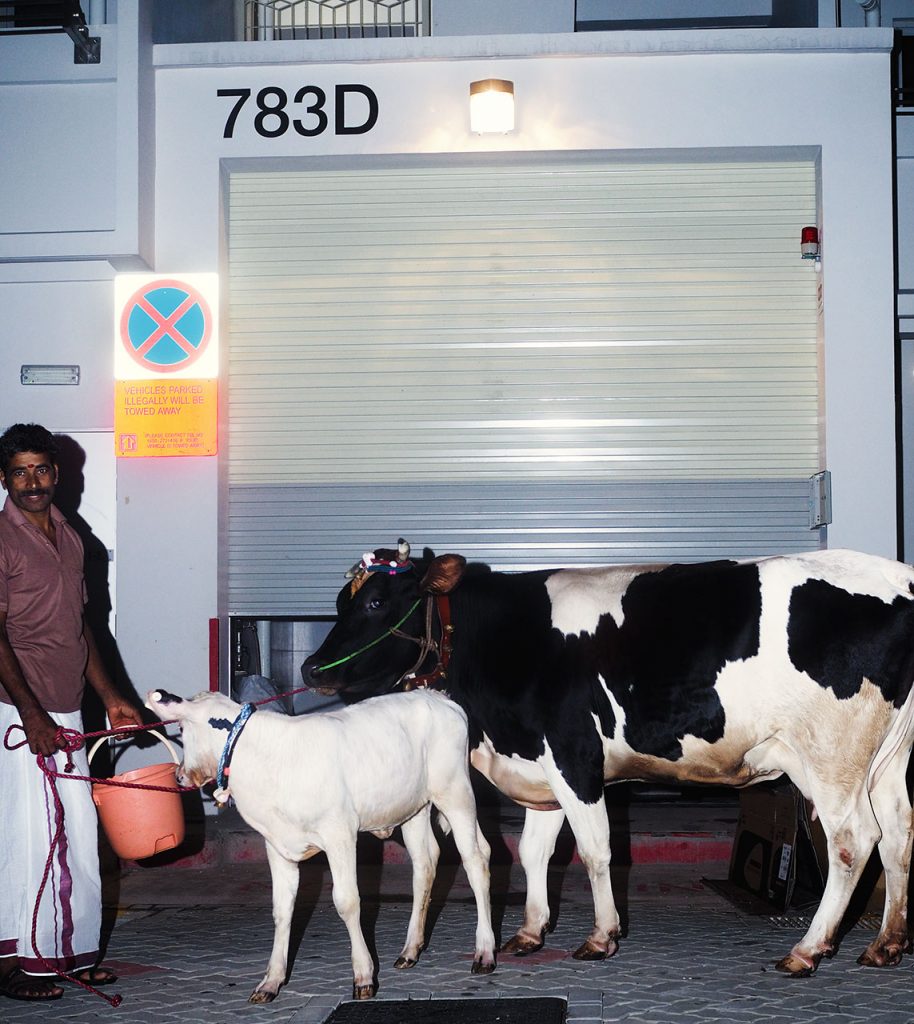
A clear veteran, she ambles off the back of the truck with surprising ease and speed. Not bad for a cow weighing 400 kg.
Next comes Rani, a smaller, clumsier version of her mother. She may be only a month old but she’s easily the size of a large dog.
As far as cows go, Durga and Rani are both incredibly tame and focused. They move in a single orderly file behind their handlers, the bells around their neck jingling with every step they take.
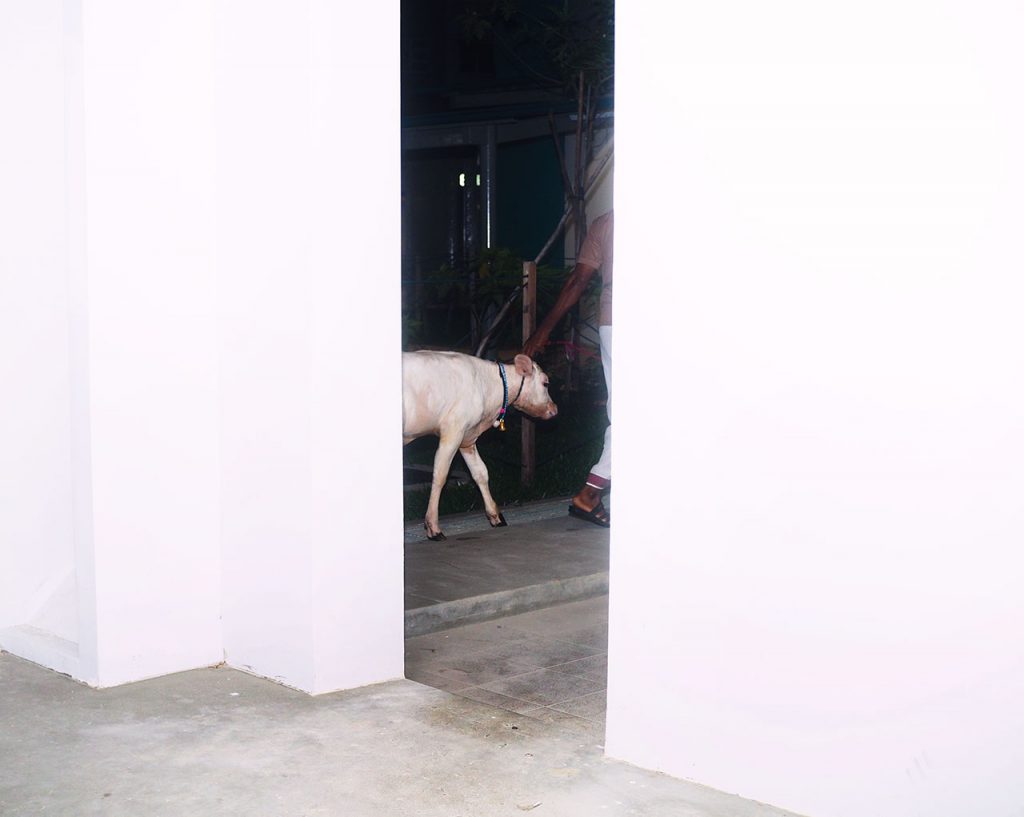
I’m doubtful Durga will even fit but Raja assures me she will. As with all house blessings, he’s already scoped out the place prior, and chosen an appropriately-sized cow. If this were a condominium or a landed property, he would’ve chosen a cow that’s much bigger.
Following Raja’s lead, Durga enters the lift and presses herself up against the wall, leaving just enough room for Rani and her handler to join them. There’s a bit of a scuffle as Rani drags her feet, reluctant to enter such a cramped space.
Eventually, she acquiesces. The lift doors close without a sound.
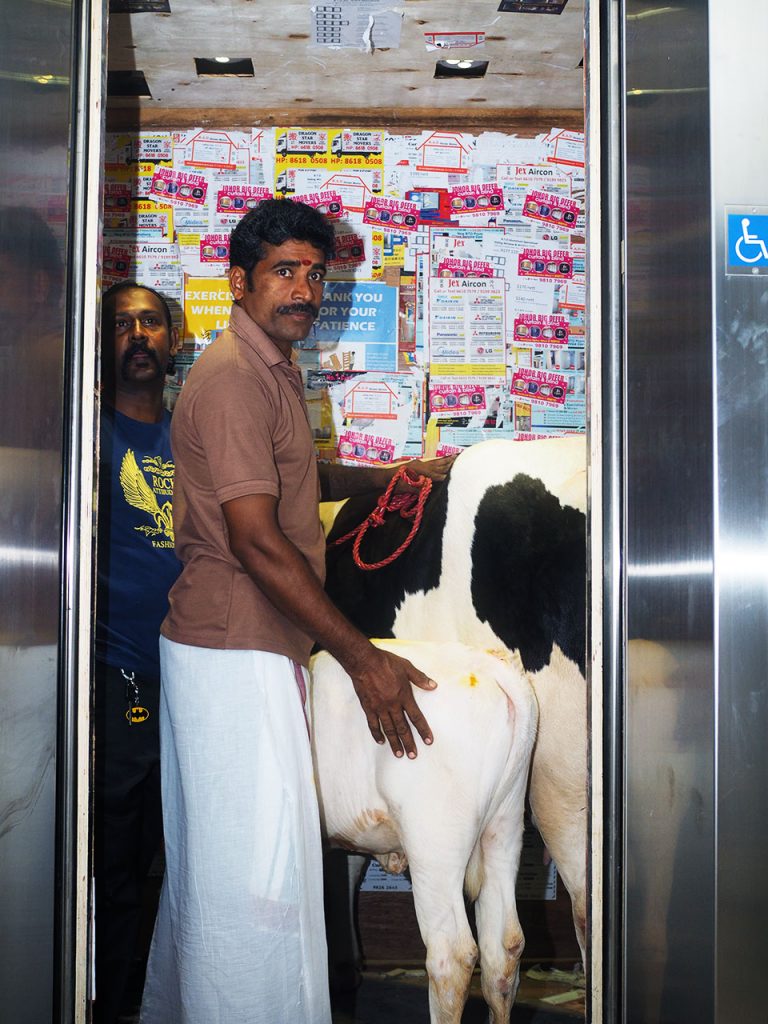
The excitement and anticipation in the air is almost palpable. An eager chattering crowd quickly forms around Durga and Rani who seem completely oblivious to all the attention. Endless photos are snapped and meanwhile, someone starts a Facebook Live stream.
I expected no less—not only because of the novelty of the situation, but because cows are highly revered amongst Hindus.
Seen as a sacred animal, provider of life sustaining milk and a symbol of the divine bounty of the earth, Hindus believe that within the cow resides 330 million (demi)gods. Hence, the act of bringing a cow to bless a house is seen as the equivalent of inviting all 330 million (demi)gods into the house.
Hindu scriptures like the Surabhi and Nadhini further symbolise the cow as Kamadhenu (Kam, meaning wishes, and Dhenu, meaning cow), believing that one’s wishes will be fulfilled upon bringing a cow into the house.
House blessings are usually called for whenever a new home is purchased. Subsequent prayers involving cows can be done every year after that should the owner wish.
It may seem archaic, but it remains an esteemed practice that is still very much alive today, having been passed down from one generation to another.
In fact, despite a hefty price tag of $1,400 for one cow and one calf (inclusive of permit licensing fees from NEA, AVA and HDB), Raja conducts about 30 such blessings a year for young couples in their new flats, up from 20 back in 2014.
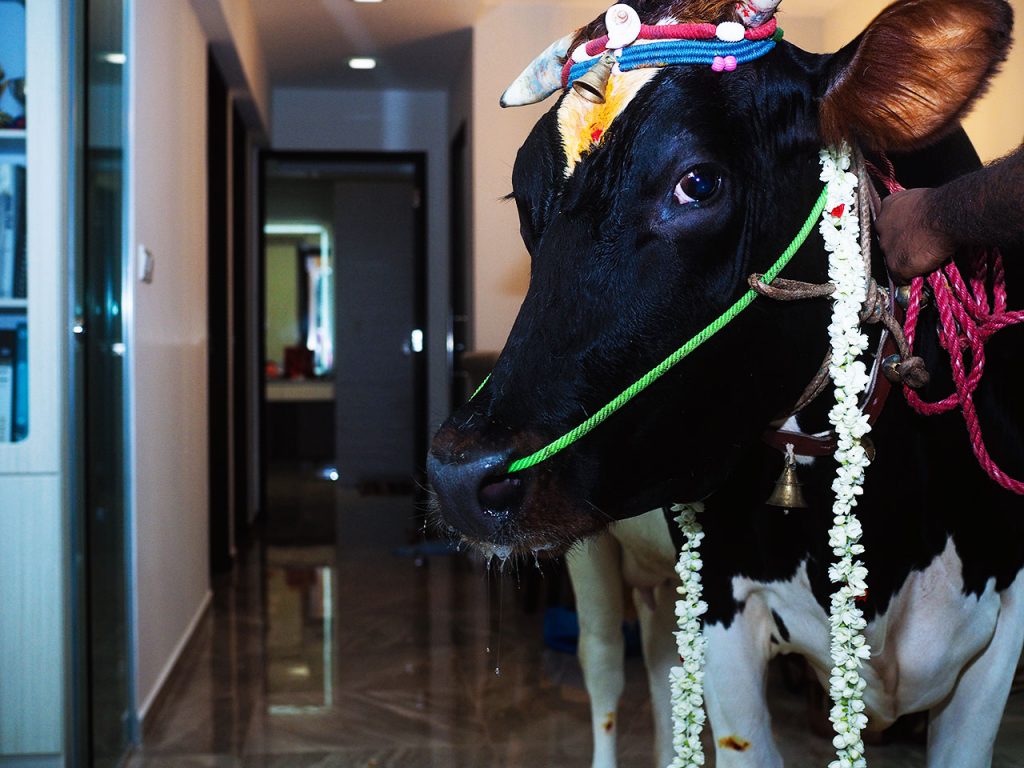
Most house blessings are arranged to take place on an auspicious time and date, following the Indian calendar and clock. Although blessings can take place on any day of the week, they are usually held before the sun rises with each blessing lasting up to 3 hours.
Fortunately for Durga and Rani, they’re only needed for the first half of the entire house blessing ritual. The priest will take care of the second half.
I open my mouth to ask another question but stop when Durga’s flips her tail to the side and, without so much as a warning, emits a stream of yellowish-greenish dung from her rear end.
Quick as lightning, Raja’s assistant produces a scoop which he uses to catch and transfer her faeces into an awaiting pail before it hits the corridor floor.
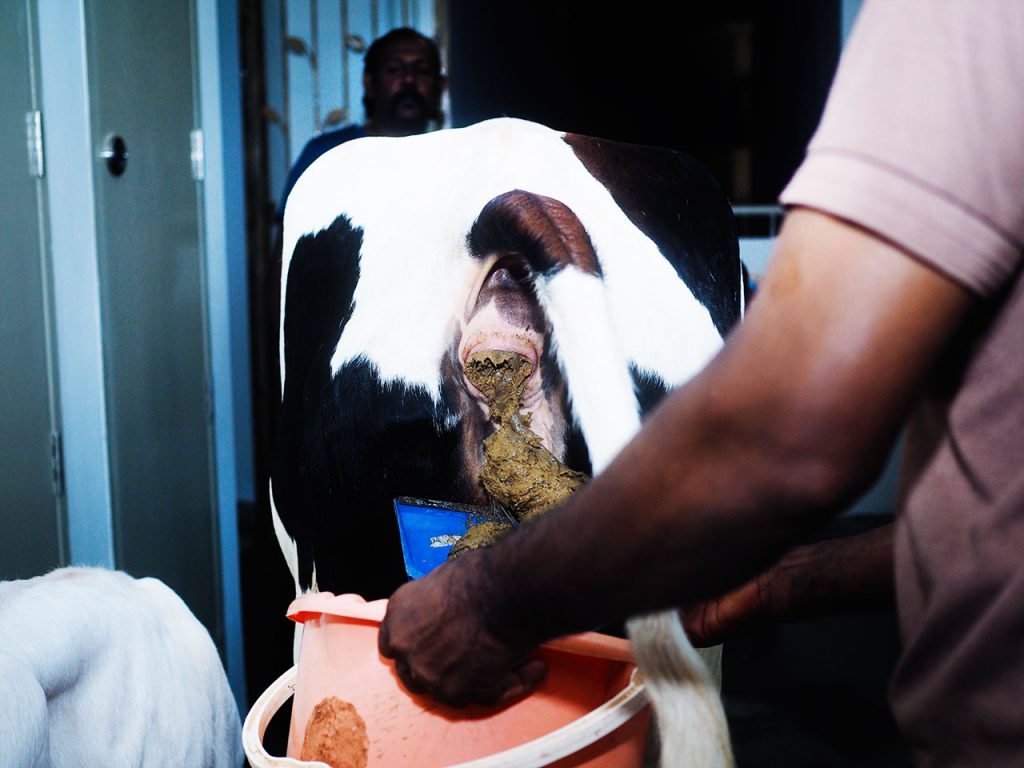
According to the Rig and Yajur Vedas (religious texts), Mahalaksmi, the Goddess of Prosperity resides at the back of the cow. As such, the act of a cow or calf defecating (Saani) or urinating (Komiyam) is believed to be a sign that the house is heavily blessed with luck and prosperity.
My excitement over witnessing Durga bless the house with her faeces is cut short by the arrival of the Priest dressed in a white Lungi (wrap).
Now that he’s here, the ritual can begin.
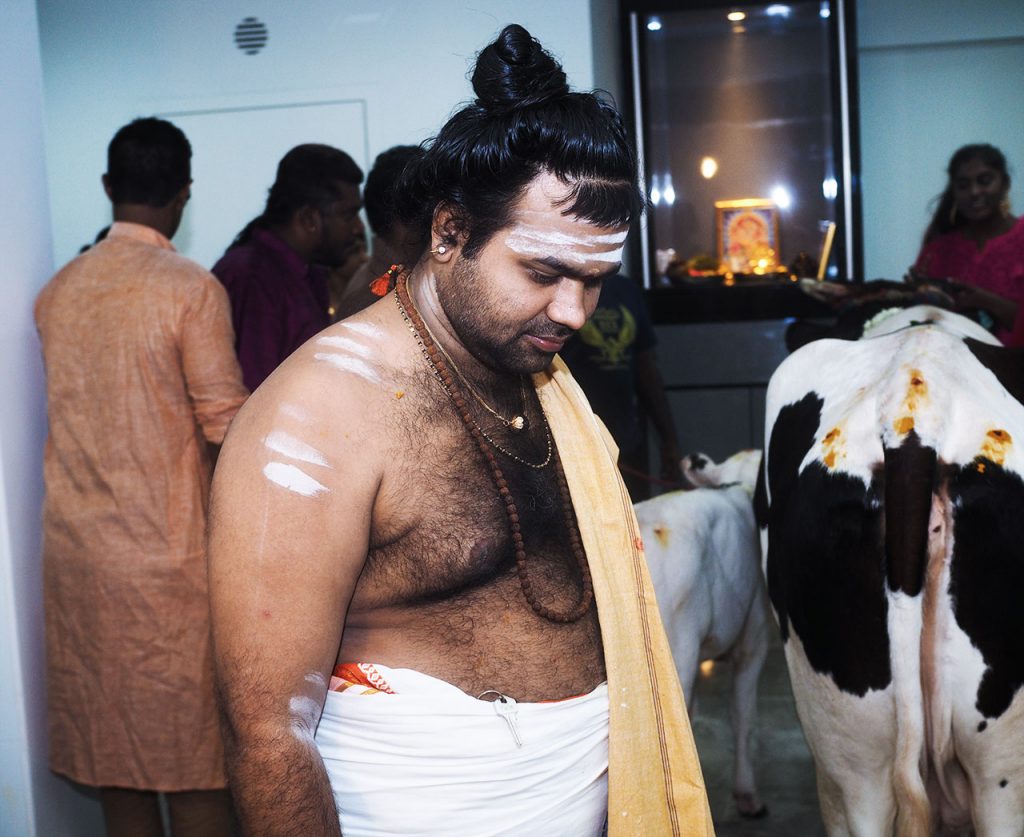
The couple take their place at the threshold of the house, right behind Durga and Rani who have been stationed with their backs facing the entrance.
The positioning is important as this ritual is meant to guard the owner of the house, while at the same time, preventing evil forces from entering.
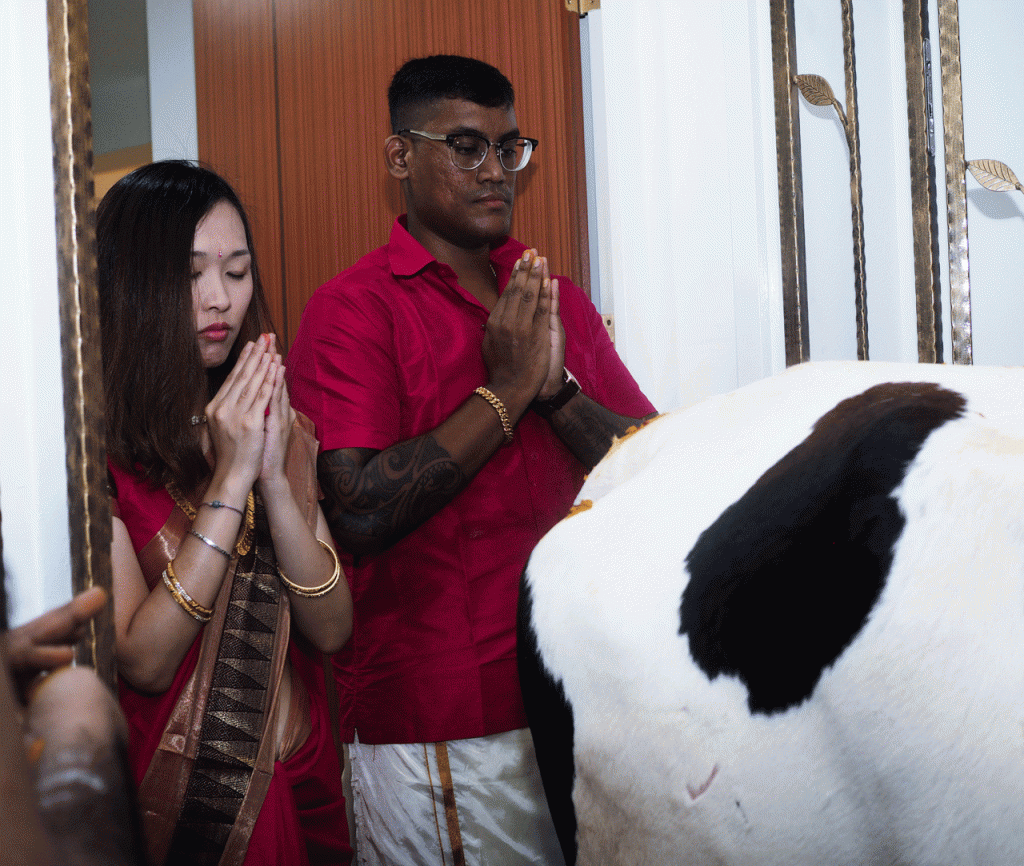
Meanwhile, Vicky and Crystal are handed baskets of red, yellow, and orange flowers with which to decorate and worship the two cows. Afterwards, they swap the flowers for a small plate containing turmeric and kumkum powder. This is to be applied to the cows’ backs as well as their front and back legs.
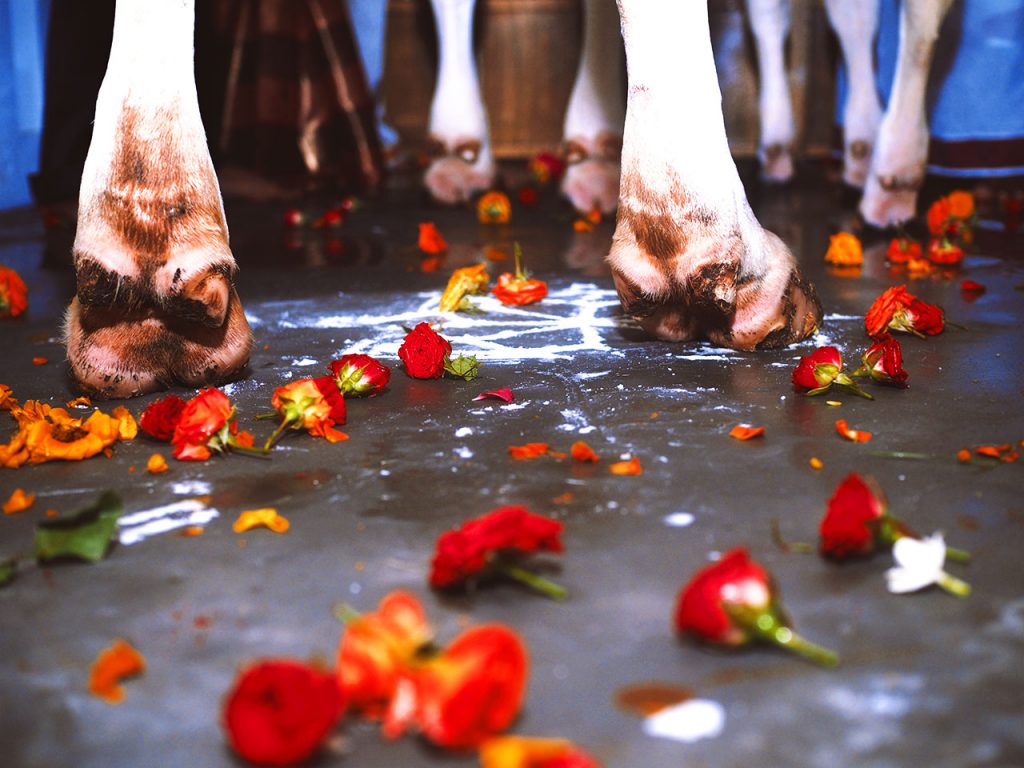
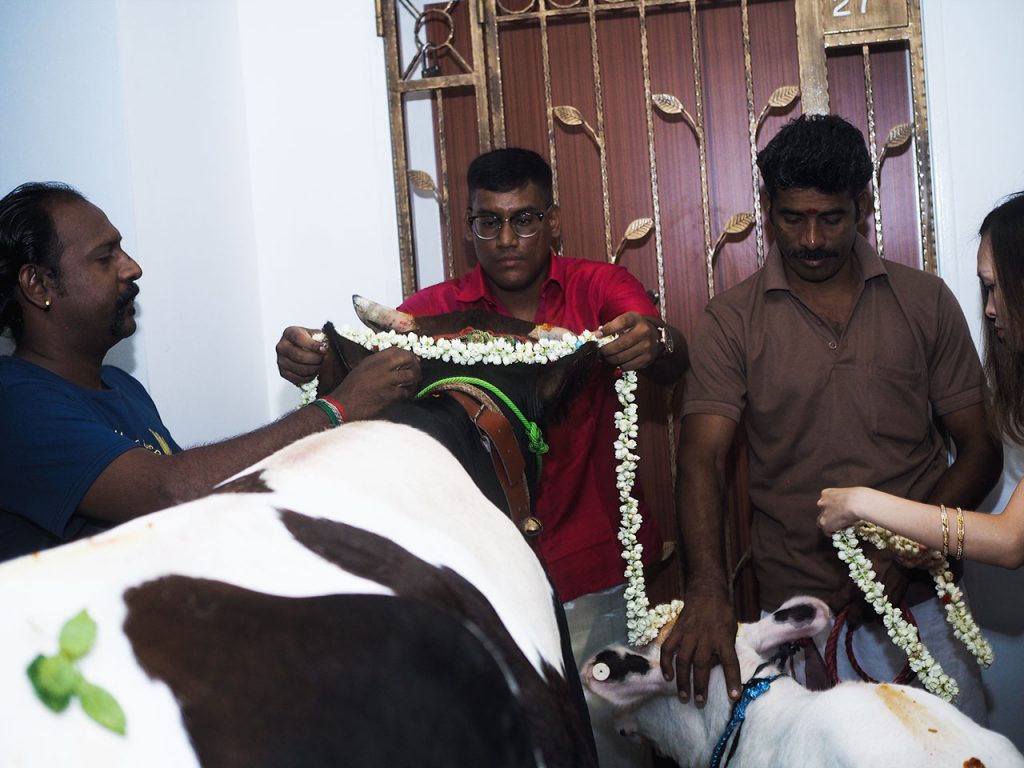
I’ve always known that HDB flats were cramped, but with a full-grown cow in the house, everything suddenly seems a whole lot smaller. The ceilings looked lower than usual, the hallways a little narrower, and the rooms, inhumanely smaller.
Taking Raja’s lead, the cows are brought on a short ‘tour’ of the house to bless each area, beginning in the dining room before moving down the hallway into the master bedroom, and then finally back out into the open living space.
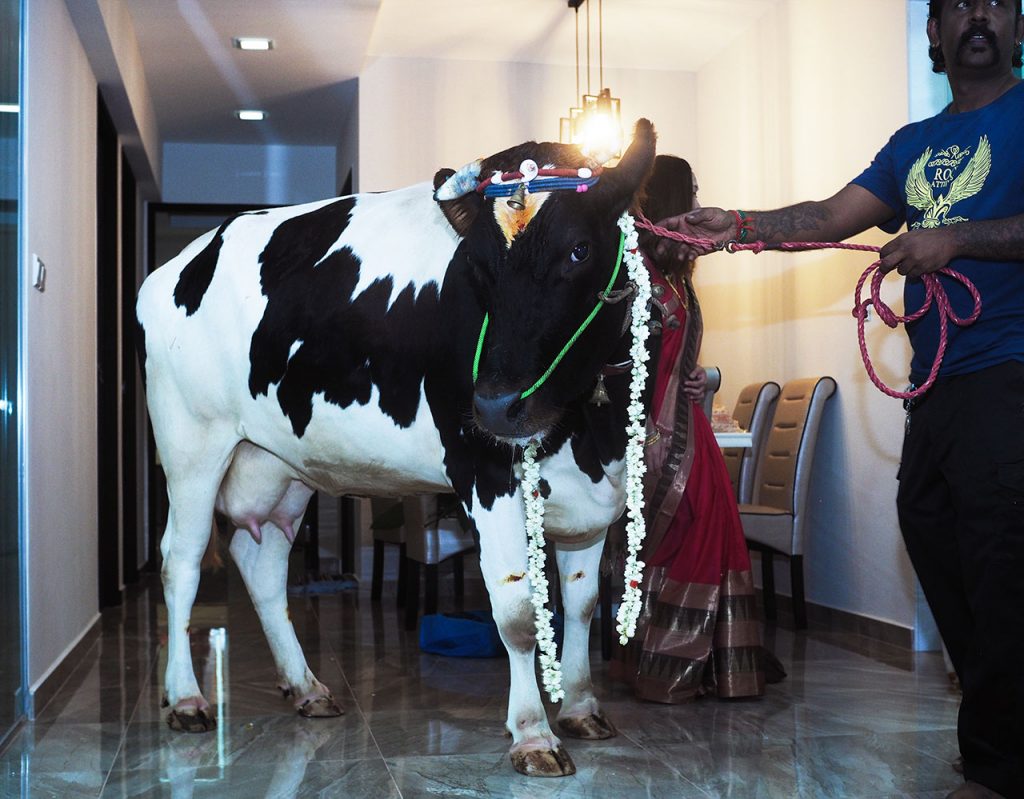
Now there’s just one final step left for Durga before she can call it a day. She needs to be milked.
From the kitchen, Vicky retrieves a metal pot, brand new and still in its box. He hands it to Raja’s assistant who places it strategically beneath Durga’s udders. Once his assistant is in a comfortable squatting position on the floor, he begins to pull downwards from the base of her teats, releasing short but steady streams of milk into the pot.
As Raja informs me, the milk is not intended for consumption but rather, as an offering to the gods and will be used to later wash the statues of the deities in the home.
The milking process continues for several minutes until the pot is finally full.
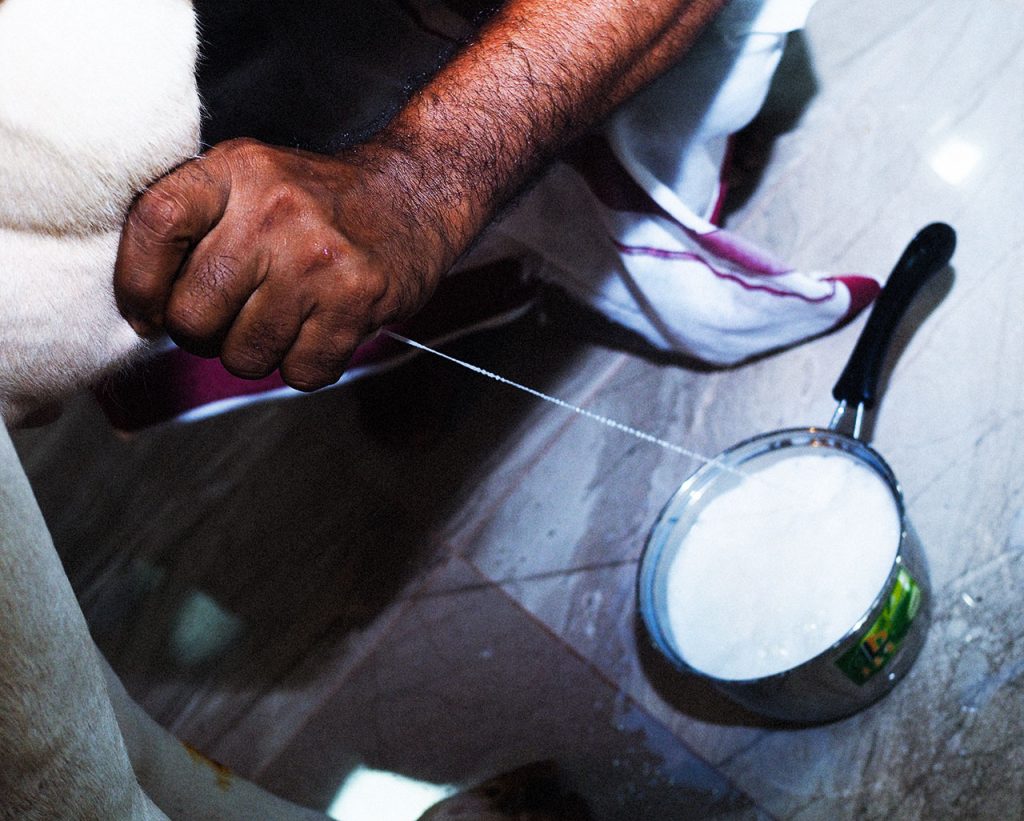
Right before they leave, as the last photo is being snapped, Rani proceeds to urinate all over the living room floor to the delight of everyone watching.
Someone applauds and a few others cheer. The gods have given Vicky and Crystal their one final blessing.
